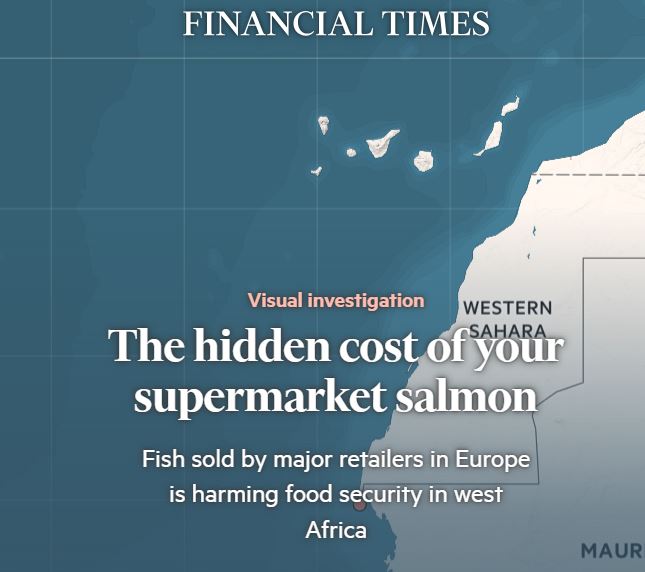 Til að framleiða eitt kíló af eldislaxi þarf tvö kíló af villtum fiskafurðum. Til viðbótar þarf í fóðrið upp undir tvö kíló af sojabaunum og öðrum næringarefnum. Með öðrum orðum, til að framleiða eina máltíð af eldislaxi þarf prótein og næringarefni sem myndu duga í þrjár til fjórar máltíðir fyrir fólk.
Til að framleiða eitt kíló af eldislaxi þarf tvö kíló af villtum fiskafurðum. Til viðbótar þarf í fóðrið upp undir tvö kíló af sojabaunum og öðrum næringarefnum. Með öðrum orðum, til að framleiða eina máltíð af eldislaxi þarf prótein og næringarefni sem myndu duga í þrjár til fjórar máltíðir fyrir fólk.
Þessi slæma slagsíða laxeldis hefur í vaxandi mæli verið til umfjöllunar í stórum alþjóðlegum fjölmiðlum. Nú síðast í Financial Times fyrir nokkrum vikum.
Í umfjöllun Financial Times kemur meðal annars fram:
In an industrial zone of the coastal city Nouadhibou, the stench of rotting fish is stifling. Guards with fierce-looking dogs on chains are on patrol, surveying the road with suspicion while waving through rusty 1990s Mitsubishi pick-ups stuffed with fresh fish.
Factories producing fish oil — and its sister product fishmeal — have multiplied along this coastline over the last decade, as they have in a number of north-west African countries.
But the Mauritanian government has embraced production of these obscure but important commodities with extra zeal. It awarded Nouadhibou freeport status in 2013, allowing foreign businesses, including those establishing fishmeal factories, to pay little or no tax. The government hoped the industry would create employment by processing Mauritania’s resources on its own shores.
But experts blame the factories and the foreign vessels that supply them for a “dizzying” fall in regional catches of round sardinella — a small oily fish widely eaten in the region.
Plummeting stocks led the industry to target other fish, including flat sardinella, a species also showing signs of overexploitation. Corruption and rule-breaking, suggested in interviews with the Financial Times, have made things worse. Scientists fear sardines — the factories’ latest target — could be next.
What happens in Mauritania has ramifications across the west African region, where food insecurity has hit a 10-year high and poor wages and prospects force thousands to leave each year. The fish targeted are migratory, meaning catches in Mauritanian waters impact stocks, diets and livelihoods across neighbouring nations, such as Senegal and Gambia.
…
The fish farming industry consumes enormous amounts of whole, wild fish. Globally, more than 16mn tonnes of whole fish — a fifth of all wild fish caught — was ground into meal or oil in 2020. More than three-quarters of this is fed to farmed seafood.
Norway alone required 2mn tonnes of whole fish to produce 1.5mn tonnes of salmon in 2020, according to a report released on Wednesday by campaign group Feedback. The Norwegian industry, which is the UK’s biggest salmon supplier with 44 per cent of the market, is planning to triple output by 2050.
“Three-quarters of this fish, most of which is sourced from countries in the global south, could be eaten directly instead,” says Natasha Hurley, campaigns director at Feedback, adding that turning Mauritanian fish into feed “represents a transfer of valuable micronutrients away from regions already suffering acute food insecurity”.
The report suggests half a million tonnes of west African fish, enough to feed 33mn people, are being turned into meal and oil every year.
…
Fish stock decline
While the Mauritanian authorities hoped their backing of the fishmeal industry would boost employment, in reality it has created few jobs while undermining the food security of some of the region’s poorest groups.Together the factories employ 2,000 people, mainly foreigners, according to an industry-commissioned report, despite churning up huge amounts of fish. In 2020, they treated more than 800,000 tonnes of small pelagics — species that live in schools in open water — up from 50,000 tonnes less than a decade earlier. Exports have risen over 10-fold since 2009.
Many of the country’s 29 processing plants are run by Turkish and Chinese owners. Luxury villas and smart restaurants serving these expatriates have appeared in secluded neighbourhoods of the overwhelmingly poor city of Nouadhibou.
The impact on fisheries has been devastating. Annual north-west African stocks of round sardinella plummeted from between 800,000 and 2.8mn tonnes before 2010 to just 160,000 in 2019. Since 2021, catches have fallen to below a tenth of their 2011 peak.
Multiple species used by the factories are considered over-exploited across the region. Several locals, including the Mauritanian fishing union head, Hademine Sidi Mahamed, say it is hard to watch their resources exported to feed foreign animals “while we are suffering with poverty”.
…
The Mauritanian government recently made moves to try to clean up the industry and the fisheries ministry says it has made “great progress” in prioritising processing for human consumption over fish feed.
Measures include increased fines for illegal fishing and caps on the amount of fishmeal factories can produce each year. All species except sardines are now banned from the plants and 20 per cent of those must be set aside for human consumption. These measures — as well as falling catches and the pandemic — are likely behind a fall in meal and oil exports of a third between 2020 and 2022.
But interviews by the FT in Nouadhibou suggest systemic rule-breaking. Several people familiar with the matter blamed this on widespread corruption.
Seven industry workers describe how Turkish vessels supplying the factories leave their catch at sea for days to rot, rendering it unfit for human consumption. Two of these interviewees, classifiers who price fish, say some Turkish boats are unloading fish using tubes with blades inside to achieve the same outcome.
Four current and one former factory worker also say there is no fish sorting process, resulting in banned species, such as round sardinella and juveniles, ending up in meal and oil. “We use all types of fish,” one worker says.
An industry document shows that, in 2022, the factories on average produced 3,077 tonnes of meal each from whole fish — far beyond their maximum quota of 1,044 tonnes. Only 3 per cent came from offcuts or waste fish. …
